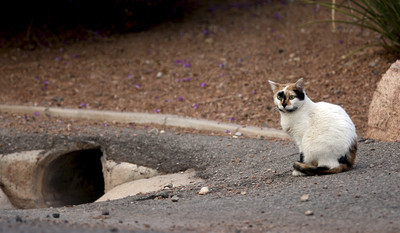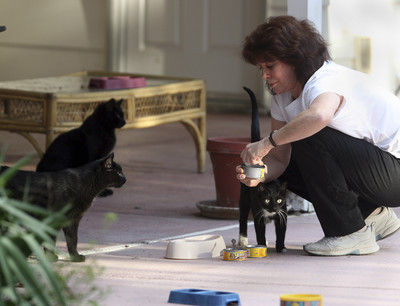Neutering to replace practice of euthanizing wild cats
Those who have tended feral-cat colonies in the shadows can now openly feed, sterilize and vaccinate the felines without fear of being fined.
The Clark County Commission voted unanimously Tuesday to create a "trap, neuter and return" program to replace the decades-old practice of simply rounding up strays and euthanizing them.
Advocates outnumbered the program's opponents by roughly 4 to 1 in the audience. The supporters applauded and whooped loudly when all seven commissioners marked a "yes" vote.
Joanie Spina, a local video director, said she's glad that she and others like her will no longer be punished for helping strays. She cares for two dozen wild cats, some of them a result of people not sterilizing their pets.
"I don't want to feel like a criminal for doing something good and trying to clean up the mess that irresponsible people have created," said Spina, who produced the video "Born to Die" about feral cats being euthanized.
Commissioner Chris Giunchigliani, who spearheaded the new code, argued that it was a more humane and effective way to curb the cat population than killing the animals. If the cats are sterilized, eventually the colonies die off, she said.
It is now legal to tend feral cats in urban areas, she said, noting that the ban will stay in effect in rural areas to protect birds and other vulnerable wildlife from the cats.
One wildlife official wasn't swayed.
As natural predators, feral cats prey on migratory birds, including endangered ones that nest within urban areas, said Janet Bair, an assistant field supervisor with the U.S. Fish & Wildlife Service.
"We're especially concerned with the destructive effect that feral-cat colonies might have," Bair said.
Some studies show that cat colonies set up in other parts of the country have proved lethal to birds, she added.
But Shirley Braverman, who oversees Spay Our Strays, said that only two types of endangered birds can be found within the Las Vegas area.
Citing her own research, Braverman said cats tend to kill sick and dying birds that can't fly away.
Giunchigliani said she will soon propose a rule that would require pet owners in the county's jurisdiction to spay and neuter their pets. That would be vital in curbing the feral-cat population, which has swelled to more than 200,000 in the Las Vegas valley, she said.
The trap-neuter-return program will be run mainly by animal-welfare groups, such as Spay Our Strays, with the help of local humane societies, Giunchigliani said.
Caretakers will work with a "sponsor" -- a humane society or animal welfare group -- to ensure the cats are sterilized, vaccinated and properly fed. Cats will have the tip of one ear clipped as an identifying mark.
The program was modeled after similar ones in cities across the country, Giunchigliani said, noting there's even a manual on the subject.
Grants, rather than tax dollars, will pay for the program's costs. Sponsors and other volunteers will apply for the grant money, she said.
A chief goal will be to spare as many cats' lives as possible. Shelter workers must notify a program sponsor that a feral cat, especially one with a clipped ear, was brought in and will soon be euthanized if it's not picked up.
John Hiatt, who chairs the Enterprise Town Advisory Board, said most of the board's members opposed the code. The Red Rock Audubon Society also expressed grave concerns about fostering wild cats that hunt birds, Hiatt said.
Some national research, he said, refutes the claim that the feral cat colonies die off when managed under trap-and-neuter programs.
But one humane society volunteer argued that the program would reduce the cat population and, in turn, decrease the current threat to wildlife.
"The cats are out there," Christina Santoro, a volunteer with the Las Vegas Valley Humane Society. "This might help manage it."
Nikki Corda, a videographer, said there's one great benefit to the cats' predatory ways.
"No one mentioned that feral cats keep the rodent population down," she said.
Contact reporter Scott Wyland at swyland@reviewjournal.com or 702-455-4519.


















